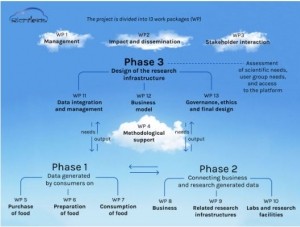Big data project set to reveal consumer food habits & health

The multi-phase project aims to provide a research infrastructure that determines how food intake and food choice can lead to improved dietary patterns to address the problem of obesity and cardiovascular disease.
The advent of innovative data collection technologies provides researchers with the tools to monitor and collect information on these behaviours.
Like the financial and healthcare sectors, consumers and businesses within the food industry generate huge terabytes of information that offer detailed descriptions of behaviours.
The researchers believe that if these data-rich sources could be linked and analysed, they will be able to meet societal challenges regarding health, well-being and climate change.
Project Richfields
Entitled Richfields, the project is headed up by Karin Zimmermann, coordinator of the project at Wageningen University in the Netherlands.
By combining previously under-exploited 'big data' generated by consumers (apps, sensors), as well as by business (retail and manufacturers) and research (surveillance data), the project will identify the most efficient approaches to food purchasing and procurement.
On the consumer side, Richfields will assess the feasibility of linking existing and new research infrastructures, laboratories and facilities, which could add to the platform's bank of knowledge.
Depending on these findings, the project will design the technical requirements to collect, compare and share information about consumer food behaviour.
This data will extend to include detail on food purchases and preparation, for instance in the kitchen, and consumption, for instance in the dining room.
“Richfields will assess what facilities, resources and services can support research, to learn more about what consumers choose to eat and how and why we make those choices,” said Zimmermann.
Big data

Big data refers to enormous sets of information that need to be comprehensively mined to uncover patterns, trends, and associations that relate to human behaviour and interactions.
It’s applications within the food industry range from keep up with changing trends, to recording food allergies, or food preferences, opening the door to personalising the dining experience in a restaurant.
On a global scale, population-based nutritional information could be used in data-driven decision making in the food and nutrition industry. This could have uses for companies developing products for personal nutrition or for governments to determine the success and failure of public health policies.
Along with the Division of Human Nutrition at Wageningen University, the project brings together organisations in Europe such as The German Institute of Food Technologies (DIL) in Germany; and the European Food Information Resource, Belgium.
Other collaborators include the European Food Information Council of Belgium; Institute Of Food Research, United Kingdom and the Européen pour la Nutrition et la Santé, based in France.

























